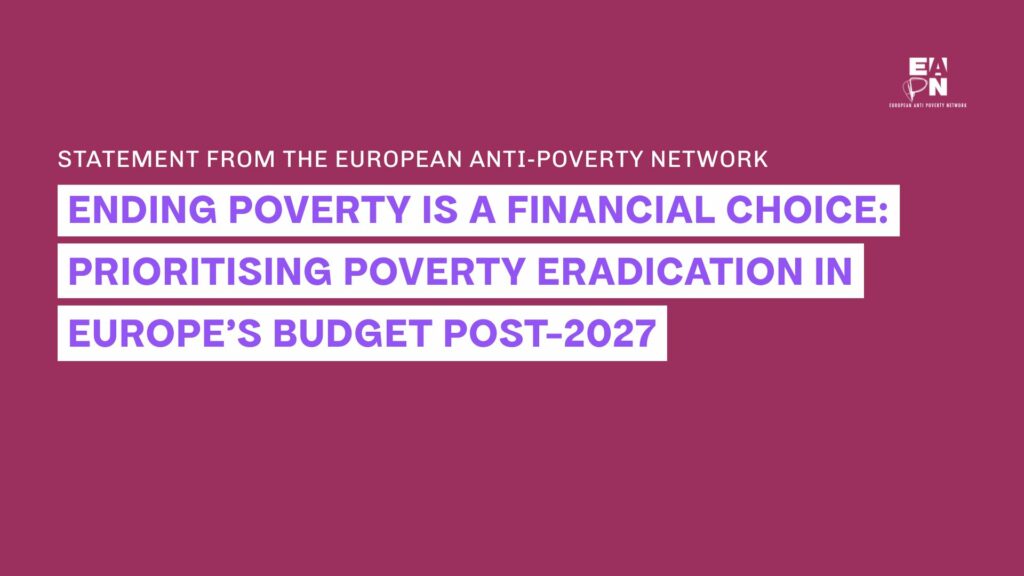
Ending poverty is a financial choice: Prioritising poverty eradication in Europe’s budget post-2027
8 July 2025
On 16 and 23 July 2025, the European Commission will unveil its proposal for the post-2027 Multiannual Financial Framework (MFF) – the EU’s long-term budget. This is a critical opportunity for the EU to commit financial resources to work towards the eradication of poverty. This proposal emerges in an alarming context, where the risk of diverting budgetary resources originally allocated to social inclusion and poverty eradication towards defence spending is becoming increasingly real.
EAPN (European Anti-Poverty Network) urges the EU institutions to seize this moment to place poverty eradication at the heart of the MFF and bring tangible change to the lives of over 93 million people at risk of poverty across the EU.
The preparation of the Multiannual Financial Framework (MFF) post-2027 comes at a pivotal political moment for the fight against poverty in Europe. Alongside the MFF proposal, the European Commission is about to renew the European Pillar of Social Rights Action Plan 2025-2030 and is starting to prepare the first-ever EU Anti-Poverty Strategy. Hence, the MFF post-2027 will be a critical tool to turn these initiatives into tangible progress for the millions of people experiencing poverty across the EU. However, EAPN remains seriously concerned about the lack of long-term, structural funding dedicated to poverty eradication.
The European Commission’s proposal to amend the European Social Fund+ regulation to encourage Member States to redirect funds towards defence investments sends a troubling signal ahead of the upcoming MFF proposal.
In the same way, the commitment made in the 25 June 2025 Hague Declaration by NATO Heads of State and Government to allocate 5% of GDP annually to core defence requirements and related security spending highlights a growing shift in priorities. Together, these developments indicate that defence and security agendas are jeopardising the objective of eradicating poverty and the scarce financial resources allocated to it.
To effectively address these challenges, it is not only crucial to ensure a strong poverty eradication perspective in the next MFF, but also, to strengthen the EU system of own resources through EU-wide taxation. The MFF proposal is the opportunity to revive the EU’s political commitment towards the Financial Transaction Tax (FTT) as a crucial tool for a stronger MFF and unlock necessary funding for poverty eradication.
Since 2021, ESF+ (European Social Fund +) has proven to be a vital instrument in combating social exclusion, in particular to support those facing severe material deprivation. Yet, given the persistently high levels of poverty and inequality and lack of significant progress towards the poverty reduction target, the current level of funding is simply not enough. EAPN calls for a substantial increase in the overall ESF+ envelope, alongside clear and binding earmarking of funds specifically dedicated to poverty eradication, with particular attention to marginalised communities who are disproportionately and invisibly affected by poverty and social exclusion and participation of impacted communities.
At the same time, the growing monopole of political discourses around defence, security and competitiveness raises serious concerns. The new EU Budget negotiation must guarantee that they do not come at the expense of vital social welfare and essential services. In the current context, green and social investments must be prioritised more than ever. It is essential to repair and strengthen public and essential services that have been weakened by years of austerity policies promoted under the European Semester and the Stability and Growth Pact, which have focused on fiscal discipline over social rights, with devastating consequences for vulnerable communities. The next MFF must reverse this trend and place social justice and poverty eradication at its heart.
